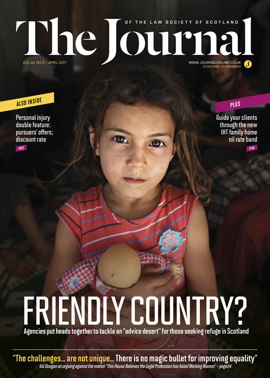Equality – the global agenda

“My job is simple: to build a world where every girl and boy has the tools and support to make their dreams a reality.” Listening to Amina Mohammed address the United Nations, my job as a commercial property solicitor suddenly seemed a world away.
On a normal weekday I am a commercial property solicitor with Shepherd & Wedderburn, but for 18 days in March I was in New York attending the 61st United Nations Commission on the Status of Women, on behalf of the World Association of Girl Guides and Girl Scouts (WAGGGS). I was one of 11 delegates from across the globe (including Madagascar, Uganda, Chile and New Zealand), representing 10 million Girl Guides and Scouts in 146 countries.
Established in 1946, the Commission on the Status of Women is a functional commission of the United Nations Economic & Social Council, one of the main forums of the United Nations. It meets annually with the aim of working towards gender equality. The Commission reviews progress on gender equality, establishes strategies and policies and discusses ongoing issues. It is unique in that in the first Commission all 15 government representatives were women, and it continues to maintain a majority of women delegates.
Each year the Commission focuses on a different theme. This year’s centred on women’s economic empowerment in the changing world of work, a topic that appears increasingly at the top of the agenda of institutions in the private and public sector.
Hard-won outcomes
Discussions on gender parity are happening in more organisations than ever before. Within the UN itself, Secretary General Antonio Guterres has pledged that gender parity is a top priority for the UN, and is making promises to meet that in the coming years in certain senior roles.
In his opening remarks at the Commission he stated: “We are all better off when we open doors of opportunity for women and girls: in classrooms and boardrooms, in military ranks and at peace talks, in all aspects of productive life.” That was just the beginning.
Over two weeks, various events were held by civil society organisations and member states in and around the UN on a range of topics all relating to women’s empowerment and gender equality. I spoke on a panel at an event hosted by Save the Children, alongside a representative from the World Bank, which focused on investing in girls and young women. At another I shared my experiences of working in a corporate environment and the work our sector was doing to achieve diversity and gender equality in the workplace.
Prior to, and throughout the duration of the Commission, negotiations between the official delegates of the member states were ongoing to agree an outcome document. This document, based on a report by the Secretary General, analyses the theme and provides recommendations for governments and various other bodies for implementation. With member states’ red lines often very far apart from one another this is not an easy document to agree, and a number of late hours were put into doing so.
The Commission does not have to agree an outcomes document, and at times it seemed like this would be one of those years. The document did pass, and the agreed conclusions from the 61st Commission can be viewed online at UN Women’s website. On a personal level, there are areas in the document which are disappointingly conservative, but I also feel that agreeing a document is an important symbol in itself, representing the collaboration of countries from around the world with a willingness to work towards gender equality.
Creating space
What I ultimately think the Commission does best is provide a space. It gives space to member states and civil society organisations. It gives civil society organisations like WAGGGS the opportunity to connect with and influence governments. These organisations are working on the ground, in touch with the real issues facing gender equality. WAGGGS attends because it believes that gender equality, and in this context women’s economic empowerment, starts with girls. We are for all girls and young women, and feel it is vital that the needs of girls and young women are taken into consideration in these conversations.
The important conversations were not just happening in the room but in the hallways and spaces in and around the UN. They were taking place among governments and non-governmental organisations – debating the issues, making connections and galvanising one another for action.
I spoke to a professor attending as part of research, who felt the Commission had re-energised the activist in her, seeing that she was not alone and that other people were out there challenging the norms. Another, a 17-year-old, was representing her school, and in addition to developing her public speaking skills, she was motivated and enthused to go back and challenge the everyday sexism she experienced.
It gives countries the space to discuss gender-related issues. It allows them to understand the challenges we still face and explore the necessary steps for us to start to overcome some of those challenges. It pushes some countries to consider the voices of others, and review the issues in their own cultural contexts. In all occasions it requires member states at the very least to acknowledge gender equality as a goal, and that it benefits society and the economy as a whole.
The Secretary General probably stated it best: “We are all better off when we open doors of opportunity for women and girls.”
In this issue
- Pursuers' offers: proceed with care (1)
- Article 50: today, tomorrow and the two-year myth
- Tackling bribery: follow the US?
- Small holdings, big complexities
- Brexit: white paper, muddy waters
- Reading for pleasure
- Opinion: Caroline Kelly
- Book reviews
- Profile
- President's column
- Land Register applications – the inside view
- People on the move
- Help on our shores
- The importance of thinking differently
- A new crime scene
- Embarking on the UK-EU negotiations
- Pursuers' offers: proceed with care
- From discount to premium
- The law, standing accused
- Equality – the global agenda
- The Discount Rate – what next?
- It's not over until it's over!
- Sheriff and jury – the big changeover
- Rates? Sorry, can’t help you there
- Looking beyond the U-turn
- Planning gain all round?
- Scottish Solicitors' Discipline Tribunal
- Nil rate IHT and the family home
- Voice of experience
- Quality Assurance Criteria amended
- Law reform roundup
- Ask Ash
- All change in the PRS
- I think you would like this
- Master Policy – what will be different?
- Scottish Arbitration Survey: please help
- Q & A corner: client due diligence at a distance
- Cybersecurity demystified
- Confidentiality and third-party complaints
- 1,000 student associates!






